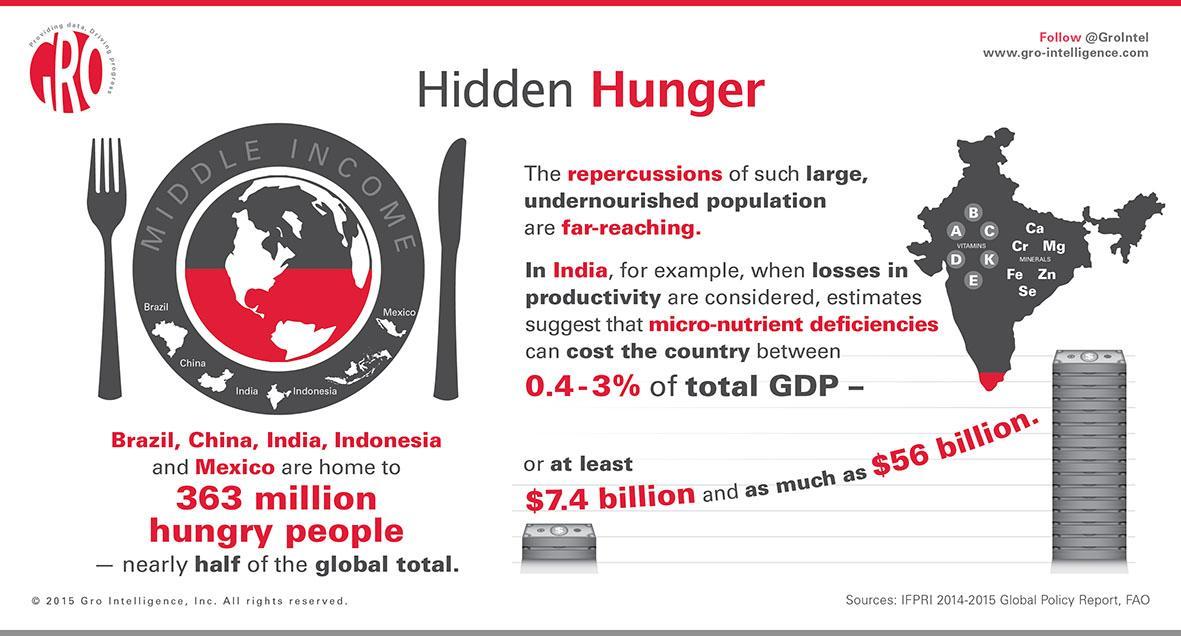Zero Hunger program is a prospective solution to the problem of world hunger, which focuses on approachability to food, cost-effectiveness of food supply, and the constant flow of it to bereft regions of the world. As it stands, the world has an overproduction of food of 50%, whereas 11% of the entirety of the world population suffers from hunger, and 34% – of malnutrition [1]. The proposed solution to be implemented in India (a hub for hunger and malnutrition, as illustrated in Fig. 1) [2], involves an online food delivery system with options to make donations, utilization of leftovers, and sharing one’s own food with the needy.

Affected Ecosystems
The word ‘ecosystem’ is typically utilized as closed-in and self-sustaining part of a natural environment. In a business sense, it represents a system of interactions between producers, consumers, suppliers, and disposal agencies, in order to create a cycle [3]. The proposed solution will affect producers and suppliers in a beneficial way, as it would enable them to provide food to the needy and malnourished without taking any losses in profitability. In fact, it is likely to increase due to the increased interests and donations from customers. Consumers would benefit in several ways as well, by being given an option to donate food and dispose of left-overs in a socially-responsible way. The poor and malnourished would be provided with the nutrition they so desperately need. Finally, waste disposal agencies would have some of the workloads alleviated off of them, as the program would reduce waste.
Design Sustainability
The design is sustainable in numerous ways. First, it does not change the foundation for application profitability and main function – the service will still provide food and derive revenue from it [4]. However, the expanded options will allow for greater flexibility and social responsibility practiced by owners and customers alike. There is potential for reducing waste, which is beneficial to the company and the natural environment. Finally, individuals on the receiving end of the program will find it helpful for sustaining themselves. The thresholds to the sustainability of the program exist, however. Not all waste would be eliminated in such a way, as some foodstuffs would still naturally expire, and others will not be of a good enough quality to be donated [4]. Finally, despite the opportunities, the impoverished and needy will not be able to rely on the program for daily and stable sustenance.
Potential Negative Impacts on the Environment, and Sustainability
Although generally deemed beneficial to the environment, the proposed Zero Hunger program could potentially have a negative impact on the surrounding environment. Firstly, the food delivered to the needy will require additional packaging, which might be disposed of in an improper fashion, thus adding to the pollution of the poorer areas of India [5]. Second, the delivery will require transportation, which would increase the company’s carbon imprint. The environmental sustainability of Zero Hunger would be achieved when the negative impacts on the environment will be overshadowed by the positive effects of lowering food waste and reducing the workload on disposal services [5].
Conclusions
Hunger is a significant hazard for human life and prosperity, especially in India. The proposed solution with the Zero Hunger problem would help reduce the number of people suffering from malnutrition. Potential issues to environmental sustainability include packaging waste and carbon footprint growth. However, the negative factors are expected to be overcome within a year. Zero Hunger will be an excellent supportive solution, but will not be an exhaustive measure against hunger in India.
References
P. Webb, G. A. Stordalen, S. Singh, R. Wijesinha-Bettoni, P. Shetty, and A. Latrey, “Hunger and malnutrition in the 21st century,” BMJ, vol. 361, p. k2238, 2018.
H. Vallianatos, Poor and pregnant in New Delhi, India. New York, NY: Routledge, 2017.
F. Cherunilam, Business environment. Bengaluru, India: Himalaya Publishing House, 2016.
H. El Bilali, C. Callenius, C. Strassner, and L. Probst, “Food and nutrition security and sustainability transitions in food systems,” Food and En. Sec., vol. 8, no. 2, p. e00154, 2019.
E. Crist, C. Mora, and R. Engelman, “The interaction of human population, food production, and biodiversity protection,” Science, vol. 356, no. 6335, pp. 260-264, 2017.